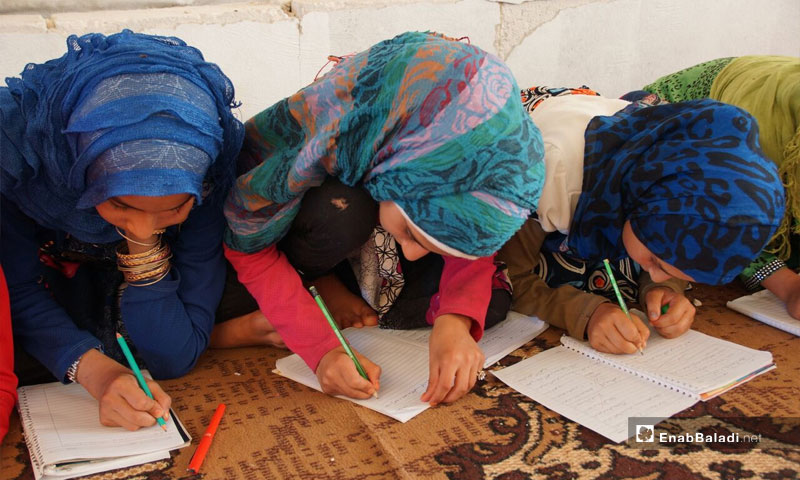



Nadir al-Ibrahim, a student at the preparatory stage in rural Hama, is forced to ask one of his colleagues, about 500 meters away from his home in the area of Shashabo, for help, as he borrows one of his/her school books.
Nadir, 15 years old, does his homework and studies for one hour only, then returns the book to his classmate, unable to describe the amount of suffering and the difficulty of preparing for the exams this way.
Since the beginning of this school year, the educational process in rural Hama has been challenged with the inability at providing school books.
In the areas controlled by the Syrian opposition, there are more than 15 thousand students, distributed over 76 schools, according to what the Director of the Exams Department, under the Free Hama Education Director, Marwan Hamadah has told Enab Baladi.
The Directorate of Education at the free Hama governorate was established in 2013, covering several of the rural Hama schools with its activities. The Directorate has conducted the first exam session for the school year of 2013-2014.
The number of the students has increased this year as a result of the massive waves of displacement and the return of calm to the areas facing the Assad’s forces controlled areas, which triggered many burdens, on top of which is the inability to secure books to the majority of the students, for several reasons, the most important of which is the very little aid offered to the Directorate and the absence of an entity or a foundation to handle the costs of printing the school books.
The Head of the Exams Department pointed out that the Directorate had a reserve of books, which has all been distributed to schools and students though the books were scarce and failed to cover the demand.
The Directorate has communicated with the Ministry of Education of the Syrian Interim Government, in addition to a number of entities and organizations which usually support education, such as “MiDAD,” “GIZ,” and other concerned entities as to provide the books or to offer the financial aid needed for printing them at the Directorate, according to Hamadah, but none of these happened so far.
Though many promises were made to the Directorate concerning aid, it is yet stuck in the state of waiting.
This inability at providing the books was enhanced by the families’ inability at buying them, for books are not available in the areas near rural Hama, in addition to the high costs of printing them at private printing presses, as Ibrahim Ramadan, a father of four students, pointed out.
The books’ absence is forcing students to write the text book materials in their notebooks, where the teacher summarizes the material and then dictates it to the students, according to Hamadah, who believes that this is not education as it wastes the time and effort of both the teacher and the students.
Hussain al-Hashim, one of the area’s school teachers, said that neither the teacher nor the student can give up on the books, because the teacher must prepare prior to classes while the students have to study what they receive at the class room, when they go home.
Al-Hashem said that teachers depend on chalk and talk style, but this method is lacking and does not end with the expected positive results, especially with the elementary school students, whose study is based on recent memory that demands the presence of a source to which the learner could return for information.
As for the fourth, fifth and sixth graders, the students’ need for books increases for the information are deeper and more specialized. At this stage, the learners most repeat the information to master them, in addition to the homework which sharpen the students’ skills, according to al-Hashim, who explained that with scientific materials such as math and science, the information cannot be learned without practice.
if you think the article contain wrong information or you have additional details Send Correction